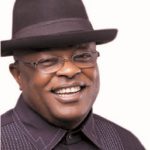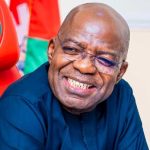Obi-Datti movement and this present house

KEN UGBECHIE
It’s going full circle. Like a cyclone routing the weeds in a farmland of wheats. The Peter Obi-Yusuf Datti movement, aka Obi-Datti movement, has become all that’s the beginning and the end of discourses in Nigeria. It’s an awakening that has all the trappings of a revolution. It’s indeed a revolution and the momentum is not lost on diplomats in Nigeria.
At a private dinner hosted by a friend and one of Nigeria’s most respected corporate gurus recently in Lagos, no fewer than three diplomats, among the many present that evening, tried to pick my brain on the Peter Obi phenomenon and the implication of the Obi-Datti movement on the nation. They also tried to, without openly mouthing it, make me project the possible and probable outcome of the 2023 general elections, especially the presidential election.
The dinner was hosted by an apolitical businessman but much of the discussion centred on politics. The fate and chances of the mainstream political parties. The candidates, their running mates and their pedigrees. Since Julian Assange, the Australian publisher and Founder of Wikileaks, busted so-called Diplomatic secrets in 2010, Diplomats have become more discreet, almost evasive, at forums. You could tell from their nuanced gestures, sometimes non-verbal responses when questions were hurled at them. They are not sticking out their head for any of the frontrunners but all of them, bar none, showed more than a passing interest on the candidacy of Peter Obi, the Labour Party candidate.
Diplomats conceal more than they give. Yet, the same would want to extract as much intelligence from you. Without overtly saying it, they all hold a common view: 2023 presidential election would be like no other. That’s also the vibe from the streets. The 2023 presidential election is a referendum of a special variant. And Peter Obi is at the epicentre of that referendum. He’s a mix of Kenya’s William Ruto and France’s Emmanuel Macron. Ruto has just been elected President of Kenya. Ruto ran as an underdog. No political godfather; no known political dynasty. He ran as a lone voice in the wilderness. He was taunted as a social media sensation that would burn out even before the election. As incumbent deputy president, he had no backing of the major political principalities.
Ruto is deputy to President Uhuru Kenyatta but he got the cold shoulders of his boss who switched camp and backed his former arch enemy, Raila Odinga. A case of the enemy of my enemy is my friend. Uhuru and Raila share a history steeped in political rivalry. They are both sons of Jomo Kenyatta and Oginga Odinga, Kenya’s first president and first vice president respectively. They were always in opposition in the slugfest of politics. But not this time. Both men, perceived by Kenyans to belong to the old brigade and what they represent, joined forces to rout Ruto but they ended up being routed. In plain language, rookie Ruto wrestled against Kenyatta and Odinga dynasties and gave them a pin-fall. And great is their fall. But this was the same Ruto that was dismissed as a social media fad. The frontrunners dismissing Peter Obi as a social media buzz will need to do an inquisition on the Ruto rave and its inductive effect on Kenyans. The Ruto story mirrors the story of Emmanuel Macron of France who as an outsider breasted the tape before the two other mainstream political parties – Socialists and Republicans.
As it was with Macron, the odds stacked up against Ruto who had to wade through a garrison of elite hate, media bias, civil society censure among others. But he prevailed. The social media sensation became a reality. Analysts and watchers of Kenya politics say Ruto won because he connected with the youths who got tired of the same old oligarchs and their children. Kenyan youths openly kicked against the same dynasties that have kept Kenya at the wrong side of development. A man pushed to the wall fights back with every once of his strength. Kenyans, especially the youths, simply fought back. They rejected the establishment and embraced a new order. Political history is replete with nations that hit a tipping point at a moment in time. They switch the order of leadership. The turnaround could be revolutionary. It could be aftermath of a war, a disaster or just the people moulting their weary and worn garments for a new one.
Nigeria’s leadership trajectory is following this pattern. In post-Independence Nigeria, it was fashionable for the military to seize the stage. Military even toppled military. But like a woman scorned, Nigerians of all tribes and tongue raised their voices and banners against the anomaly called military rule. The collective civil resistance chased away the military. To the credit of that civil resistance, the nation has done 23 years of unbroken democratic rule for the first time in nearly 62 years of self-rule.
But Nigerians appear fatigued of their cherished democratic rule. The rage in the streets, the vibes from the marketplaces and the pangs of pain visited on the people by the pantheon of bad leaders point to a people disappointed by the choices they made. They want a change. They want a clean break from the old brigade.
The Nigerian youths, in particular, are chanting a new song. The incompetence and collective failure of their leaders past have aggregated to a massive crust of anger in the youths. This is all working out for the younger generation of politicians. One man that could profit from this new wave of change is Peter Obi whose running mate is an equally young and progressive-minded Yusuf Datti Baba-Ahmed. The pair carries the aura of Macron and Ruto. They represent a Third Force. They have been ridiculed by the establishment as social media whiffs. The same way Ruto was mocked by the Kenya political dynasties. Yet, he won. In Kenya, as in Nigeria, there is electronic transmission of result using the Result Transmission System (RTS) which must tally with the manually tallied result in Form 34. Nigeria has just entered a new phase in her electoral history with electronic transmission of results. This makes the electoral process unobtrusive and reduces elements of human manipulation. Bottom line: The people’s vote will count. This is why it amounts to foolhardiness for any of the establishment political parties to dismiss Peter Obi as an internet fad that will fade with time. Obi-Datti is a movement representing the angst of all Nigerians. It encases in its bowel all the years of failed promises of past leaders. Obi-Datti is a counterfoil to the current incompetence of President Buhari and the treachery of those who foisted him on the nation.
Those who dismiss Obi-Datti movement do so at their own political peril. It’s a movement without borders, untethered from primitive sentiments of ethnicity and religion. It gave birth to the unprecedented surge in voter registration. It brought the youths out of their comfort zone. It has raised the bar in political consciousness among the youths, women, the underclass and persons who hitherto had been indifferent. Over all, Obi-Datti tells the world Nigeria is capable of politics of ideas and debate, not cudgels and clubs.








